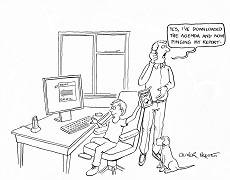May 28, 2014
Goodbye 9-5: flexible working practices help retain and attract staff
New ways of working are being fuelled by employees desire to take greater control of their lives. Over three-quarters (77%) of respondents in a survey by YouGov for Virgin Media Business said that remote working helps them address their work-life balance and almost four in five employees (78%) believe companies today need to offer it to attract and retain staff. As part of the research, psychologist Professor Cary Cooper reveals remote workers fall into four groups which range from ‘beginners’ to tech savvy ‘connectors.’ He stresses the need for employers to not only kit out their employees with the technology they need to work remotely, but also to educate them on flexible working best practice tips and guidelines because: “Ultimately this will help them ensure there is consistency across employees’ standard of work regardless of location, and will also ensure they remain as productive as possible.”
Fully 84% of the UK employees surveyed stating that the traditional 9 to 5 business hours apply less now compared to 10 years ago and nine out of 10 respondents (92%) also believe that due to the technology available, flexible working can be really efficient. There are also strong commercial reasons; as nearly six in 10 employees (59%) are now expected to work around client or customer needs, often outside of business hours As part of the research, Virgin Media Business teamed up with Professor Cary Cooper, psychologist and professor of organisational psychology and health at Lancaster University Management School and founding director of Robertson Cooper, to identify ‘typologies’ to understand the characteristics of remote workers:
Beginners – These people are fairly new to the concept of remote working, and may have just started working this way, are considering it as an option, or their personal circumstances have forced them to look into remote working.
Loungers – These people are in the early stages of remote working. They focus on working from home rather than from remote locations as they have a greater tendency to want to slow down the intensity of work, which could be partially down to the job at hand.
Adapters – These people are happy to embrace new ways of working and are supportive of how technology can facilitate this, but they need some guidance on how best to use it.
Connectors – Very tech-savvy; these people are always on, connected and keen to take the business to a better place. Typically, they embrace the technology, plan their day, and are great with time efficiency, contactable and very flexible. The survey also investigate when and why remote working is MOST popular:
- 20% travel disruptions.
- 17% Unconventional working hours.
- 18% the day before a bank holiday.
- 16% the day after a bank holiday.
- 13% weather.
- 11% travelling to and from clients.
- Over half (56%) said they are most likely to work remotely on Friday.
The UK’s digital economy is stronger and more competitive than ever before,” said Duncan Higgins, marketing director, Virgin Media Business. “Technologies such as Unified Communications are enabling businesses to transform the way they work. In seizing the opportunities that these new technologies are creating, businesses are able to change the work environment; giving staff the freedom and flexibility to work in a way that is most productive for them and, as a result, their organisations. It’s a win-win situation for employees and employers alike,” ss. “But while these flexible working practices are being put in place to boost business and cater to employees’ needs, businesses must give staff the capabilities and training to use it effectively. With the right tools in place, organisations can create a productive and collaborative workplace that benefits employees, customers and the business as a whole.”



















Five things we have learned about flexible working ahead of the new right to ask regs - Workplace Insight
June 24, 2014 @ 7:15 pm
[…] benefits employers do see from flexible working tend to involve attracting and retaining staff. In other words, employees see flexible working as an end, firms see it as a means. Even in a […]